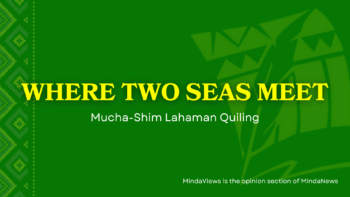(This piece is a chapter of a still unfinished novel. The characters are fictitious, but the story is based on the author’s personal encounters with victims of martial law. By victims, the author refers not only to those who suffered but also to those who lost their own humanity by inflicting inhumane acts on their fellow Filipinos.)
No matter how much he squinted Karlo could not make out if the walls of the room were made of bricks or of hollow blocks pasted together by concrete. The solitary source of light, a ten-watt incandescent bulb, hanged directly overhead from a ceiling worn out by rats, the elements and time, its faint illumination exploding on his bruised, bloodied face every time he raised his eyes, now almost closed by contusions and blood clots. He felt he could not move a muscle, not a hair even, maybe not even his spirit, the one thing that had kept him alive and able to breathe whatever remained of the little air of freedom around him. Karlo struggled to recall every detail of what he had gone through and, in a mix of despair and feeling of abandonment, he tried to attach meanings to it all. How many days had he been tied to this cursed chair of cursed men and women in this cursed chamber of… He found himself groping for words to describe the sadism and cold-blooded bestiality of his unwanted visitors in this cold hell that seethed with the hatred of the oppressors and the wrath of the oppressed, a place that had witnessed the strength of spirit of comrades who had suffered hell like him as well as, betrayal of comrades by comrades, of friends by friends. Here the flame of subversion had either dimmed or shone brighter with the indignities of each torture session.
Karlo’s unwanted visitors always came as a pair, one in a sleek uniform with a stern, although well chiseled face, the other a burly, balding aide who never spoke and wore a blank stare and was barely aware of the prisoner’s presence, the kind of man who would exist only when it becomes necessary. It could have been an excellent subject in behavioral analysis, the way Karlo’s tormentors performed their job with the insensitivity and efficacy of programmed machines. The interrogator, the officer in sleek uniform, barked his questions – or demands – with the tone of practice. He did all the verbal tasks, many times stooping down to shout in Karlo’s ears while grabbing the prisoner’s hair and angling his face upward, to see the pain and fear in his bludgeoned eyes. The aide was as brutal in his silence. No order was needed; he knew exactly when to turn the knob on that contraption that pricked Karlo’s naked body with a regulated amount of electric volts. At times the shock entered through Karlo’s nipples, at times through his genitals. Either way, his limbs would lurch in a sensation that was more than pain. And whenever the knob was turned off Karlo would slump back, his breathing tired but fast, his whole being on the brink of total despair urging him to commit the convenient, shameful act of betraying his comrades and all the truths that he had stood for. In between the electrocution the aide would land blows on Karlo’s cheeks, abdomen and lobes. At some intervals, the aide would light a cigarette and make an ashtray of Karlo’s arms, legs and belly. Karlo, however, proved to be a tough nut to crack the torturers had to use virtually all techniques at their disposal to break his spirit, or at least, his sanity – water cure, wet submarine, dry submarine, techniques the military had learned in Fort Bragg, reputed to be a training ground in the art and science of counterinsurgency for military officers in repressive Third World regimes.
But for five days and five nights in a row Karlo held on, sustained by sheer will and by forcing his mind to neglect the brutal, physical pain by drifting into a stream of pleasant memories, to his days as a toddler frolicking in the river with his mother, brothers and sisters, naked, innocent, laughing and unafraid of the sun. His spirit wandered back to the happiest corners of the past, until the pain from the beatings, the electric shocks, the cigarette burns and all waned into nothingness so that on his fifth night in cold hell, Karlo no longer felt fear when the interrogator and his aide walked in. The predictable questions had become inaudible and the blows capable of inflicting pain no more, although Karlo was unsure whether it was his mind or flesh – or maybe both – that had turned numb.
Years after he regained his freedom, when a new government had assumed power and when he already had a family of his own and his children had all reached near-puberty, Karlo would harbor doubts whether he really survived the torture inflicted on him.
